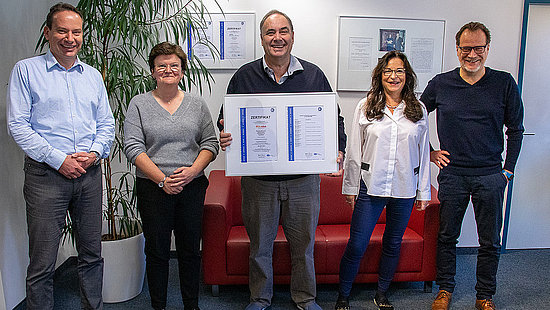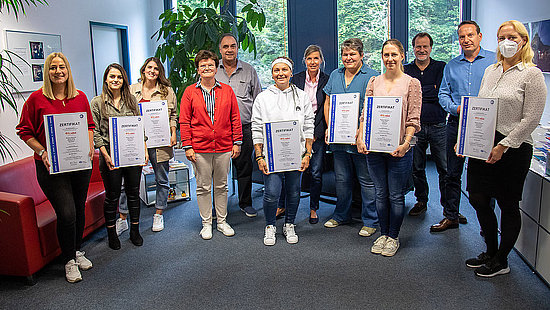Minihaus News
“TÜV certification is just the icing on the cake”
Last year, TÜV Süd certified Minihaus München to DIN ISO 9001. This is evidence of an “outstanding” quality management (QM) system at Minihaus, something only a few nurseries in Bavaria can boast. But what does it mean for the routine in Minihaus nurseries and how do parents and their children benefit from the quality management system? We spoke to the Quality Management Officer, Andreas Hellmann, to find out.
Mr Hellmann, how has the routine at Minihaus changed as a result of certification?
Our routine hasn’t changed that much – really, certification is just the icing on the cake for our quality management work. At Minihaus, we have been working with QM for years, dealing with questions like “What can we do better? What can we optimize?” The TÜV certificate now simply proves to outsiders that we continuously develop the quality of our services.
Do you have an example of what this kind of thing can look like?
In all our Minihaus nurseries and at our head office, we have a schedule of objectives under constant review. In other words, we see whether the measures are still right, whether they are suitable for achieving the specified objectives, whether the objectives themselves are still meaningful or whether they need modifying. This shows that we work continuously on quality management.
So how is quality management reflected in the context of the educational work with the children?
For the core educational processes, for example, we collaborated with our employees to draft uniform standards and specify quality objectives.
For the core process of acclimatization, for example, we have described in detail every process step from initial contact with parents to the meeting with them at the end. For example, there are templates for the meeting at the end, with a list of questions teachers can use as a basis – for example, “As a parent, what was your experience of the acclimatization process at Minihaus? What changes have you noticed in your child at home?” This not only provides a structure for the teachers’ working routine, it also forms a basis for communication with parents. The really important thing here is that we always incorporate the experiences of our staff.
How do parents and their children benefit from quality management?
The certificate gives parents the confidence that they are entrusting the most important thing in their lives – their children – to a TÜV-certified facility which works to high quality standards. Once a year, each Minihaus draws up a schedule of objectives. These are developed from a range of sources, including from the parent survey which we conduct regularly. An example of one such objective might be “communication with parents needs improving”. We then consider what measures would achieve this objective. An example of a conceivable measure would be to hold a parent café.
People tend to think quality management is a rather boring topic. What is the attitude of Minihaus staff to QM?
Happily, our staff are completely and absolutely behind QM and actually get some fun out of it. I’m convinced that quality management needs to be lived from the ground up in order to work. A good example is our Kinderhaus München, where quality management has been part and parcel of life for over 20 years, such that staff now live and breathe QM. This is where we want to get to with Minihaus, too. The important thing is that staff are involved right from the outset - in workshops, for example. In describing the processes, such as those of acclimatization or parent/teacher discussions, staff should then incorporate their own experiences – after all, they are very close to the subject and are responsible for implementing any specifications in the routine. This is much more meaningful than the board sitting in its boardroom to develop the process.
What do audits look like?
Internal audits take place in all Minihaus nurseries every year. Staff go into the individual nurseries as auditors and check whether work and conduct there is in line with process descriptions and specifications, for example. The auditors’ own experience, ideas and suggestions are always part of this process, too. After the audits, a report is written and a schedule of measures is derived from the report to ensure that Minihaus nurseries are subject to a process of continuous improvement.
External audits are similar, but examiners from the TÜV organization come to individual Minihaus nurseries to check processes and make any suggestions for improvement. The audit primarily involves listening. The word “audit” come from the Latin and means to hear or to listen. The aim is to discover together where there is potential for improvement in order to exploit it.
Many thanks for this insight into the world of QM, Mr Hellmann!
Interview conducted by Julia Hosan

